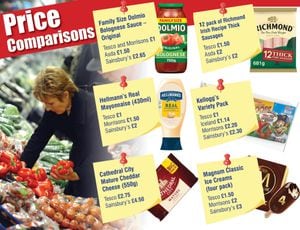Checkout how the prices of your favourite foods compare at supermarkets
Britain’s main supermarkets are engaged in a furious battle to claw back customers who are feeling the pinch after Christmas.

This means better deals for shoppers as a host of special deals and price cuts are rolled out.
Morrisons and Tesco have both announced huge price cuts across hundreds of household favourites and big name brands.
Morrisons has lowered the price of nearly 1,000 items online and in store, with tinned goods, lunchbox snacks and multivitamins up to 20 per cent cheaper than usual.
Meanwhile, big brands including Heinz and PG Tips are now on sale for up to half price at Tesco, which has reduced the price of hundreds of products to mark the 100th anniversary of it launching as a market stall in London.
Price comparison website Mysupermarket lists Tesco as the cheapest stockist of Nescafé Gold Blend, for example, with a 200g jar costing £4, instead of £7.49, and a box of 200 PG Tips listed at £2.80, instead of £5.60.
Professor Heiner Evanschitzky, co-director of Aston Centre for Retail Insights at Aston University, said: “Price cuts at the beginning of the year are nothing new, it is a chance for supermarkets to polish their price image.
“Given that a large supermarket stocks well over 20,000 items, cutting prices on a few well-known, highly visible products is not making a huge impact on the bottom line.”
The cut-price deals are expected to continue for 12 weeks at Morrisons, and four weeks at Tesco.
Elsewhere, Sainsbury’s started its new year price promotion last Wednesday.
Message
Even John Lewis-owned Waitrose, traditionally known as a high-end store, has got in on the act, and is reducing prices by 30 per cent on a range of goods, from tea to toothbrushes.
Frozen foods chain Iceland has cut prices across its Luxury fresh meat selection, with a beef rib joint going for half price at £9.50, and Luxury Douglas Spruce Smoked Gammon £3.50, down from £7.
“Our research has shown time and again that consumers have very little price knowledge and typically think that prices are much higher than they actually are,” added Prof Evanschitzky. “Therefore, cutting prices on some highly visible products conveys the message that the retailer is ‘well-priced’. It improves a retailer’s price image.
“I would not be surprised if prices on other items are increased at the same time price cuts are made on highly visible products, probably items that are less under the radar or items consumers have very limited price knowledge of.
“In any event, cutting prices is a lose-lose situation. It is a marketing tactic that is very easy to copy by others and therefore less likely to create a competitive advantage. What we have seen over and over again, is that one retailer cuts prices, others follow suit, thereby destroying the competitive advantage and reducing margin for all retailers.”
The big retailers’ Christmas figures have shown that German discounters Aldi and Lidl continue to eat away at their overall sales.
Aldi sales rose by 10 per cent in the run-up to Christmas and reached a record of almost £1 billion in December.
Fuel
And while the cuts in-store are aimed at drawing customers back into the fold, the major retailers are also taking the price battle to the forecourts.
Three supermarkets are cutting petrol and diesel prices amid claims that fuel retailers are overcharging motorists. Asda, Sainsbury’s and Morrisons announced they will reduce the cost of petrol by up to 1p per litre and diesel by up to 2p per litre this week.
It is Asda’s seventh fuel price drop in the past three months, cutting pump prices for a litre of petrol and diesel by 14p and 11p respectively.
The firm’s national fuel price cap will be £1.14p per litre of petrol and £1.24 per litre of diesel.
Asda and Morrisons implemented the new prices yesterday, while Sainsbury’s will make the change today.
It comes on the back of a tough year for the retail industry which has been hit by major store closures and job losses.
Poundworld, Toys R Us and Maplin went bust and disappeared from British high streets altogether.
Other household names – Homebase, Mothercare, Carpetright and New Look – were forced into restructuring deals with their landlords, closing hundreds of stores.





